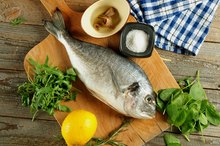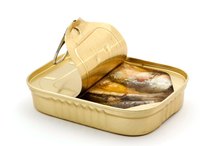Is There Limit to How Much Tuna Fish and Sardines You Can Eat?
Fish, including sardines and tuna, is a healthy food that provides you with omega-3 fatty acids and other beneficial nutrients. The American Heart Association recommends that you consume at least two 3.5 oz. servings of fish per week. However, concerns exist over possible contamination with mercury, PCBs and other contaminants.
Sardine Safety
Sardines are one of the types of fish that contain the least mercury, according to the National Resources Defense Council, so you can consume sardines to meet your recommended intake of fish 3. The U.S. Environmental Protection Agency does recommend that women and children limit fish consumption to an average of 12 oz 2. per week, regardless of the type of fish you consume.
Tuna Safety
How Much Protein Is in a Filet of Flounder?
Learn More
The amount of tuna it is safe to consume depends on the type of tuna you choose. Skipjack tuna and canned chunk light tuna contain moderate levels of mercury, so you should consume no more than six 3.5 oz. servings per month of these fish. Yellowfin tuna and canned albacore tuna are high in mercury, so limit your consumption to three 3.5 oz. servings or less per month. Bigeye and ahi tuna contain the highest amounts of mercury, so avoid these types of tuna altogether.
- The amount of tuna it is safe to consume depends on the type of tuna you choose.
- Skipjack tuna and canned chunk light tuna contain moderate levels of mercury, so you should consume no more than six 3.5 oz.
Nutrition Facts
A 3.5 oz. serving of sardines canned in oil contains 210 calories, 24 g of protein and 10 g of fat, including 2 g of saturated fat. Sardines are a good source of vitamins B-12, niacin and D, and the minerals phosphorus and calcium, and also provide you with some riboflavin, iron, zinc, magnesium, vitamin B-6, thiamine, vitamin A and folate.
A 3.5 oz. serving of tuna canned in water contains 120 calories and 25 g of protein. Tuna is a good source of niacin and vitamin B-12, and provides you with some vitamin B-6, phosphorus, magnesium, iron, zinc, riboflavin and thiamine.
- serving of sardines canned in oil contains 210 calories, 24 g of protein and 10 g of fat, including 2 g of saturated fat.
Considerations
Nutrition of Mahi Mahi Vs. White Fish
Learn More
Although sardines are higher in calories than canned tuna, they provide more vitamins and minerals and more omega-3 fats. Albacore tuna from the U.S. or Canada and yellowfin tuna from the U.S. are both more environmentally friendly and better sources of heart-healthy omega-3 fats than canned light tuna or canned albacore tuna.
Related Articles
References
- Environmental Defense Fund: Popular Seafood -- Best and Worst Choices
- Environmental Protection Agency: What You Need to Know about Mercury in Fish and Shellfish
- National Resources Defense Council: Consumer Guide to Mercury in Fish
- Fish, tuna, light, canned in water, without salt, drained solids. FoodData Central. U.S. Department of Agriculture. Published April 1, 2019.
- Dhurmeea Z, Pethybridge H, Appadoo C, Bodin N. Lipid and fatty acid dynamics in mature female albacore tuna (Thunnus alalunga) in the western Indian Ocean. PLOS ONE. 2018. doi:10.1371/journal.pone.0194558
- Vitamin B12 or folate deficiency anaemia. National Health Service. Updated 2019.
- Sparkes C, Gibson R, Sinclair A, Else PL, Meyer BJ. Effect of low dose docosahexaenoic acid-rich fish oil on plasma lipids and lipoproteins in pre-menopausal women: A dose⁻response randomized placebo-controlled trial. Nutrients. 2018;10(10). 10.3390/nu10101460
- Simonetto M, Infante M, Sacco RL, Rundek T, Della-Morte D. A novel anti-inflammatory role of omega-3 PUFAs in prevention and treatment of atherosclerosis and vascular cognitive impairment and dementia. Nutrients. 2019;11(10). doi:10.3390/nu11102279
- Damanti S, Azzolino D, Roncaglione C, Arosio B, Rossi P, Cesari M. Efficacy of nutritional interventions as stand-alone or synergistic treatments with exercise for the management of sarcopenia. Nutrients. 2019;11(9). doi:10.3390/nu11091991
- Diabetes superfoods. American Diabetes Association. Updated 2020.
- Histamine toxicity. American Academy of Allergy, Asthma & Immunology. Updated 2020.
- ACOG practice advisory: Update on seafood consumption during pregnancy. American College of Obstetricians and Gynecologists. Updated 2017.
- Canned tuna. Seafood Health Facts: Making Smart Choices Balancing the Benefits and Risks of Seafood Consumption. Updated 2020.
- Selecting and serving fresh and frozen seafood safely. U.S. Food and Drug Administration. Updated 2019.
Writer Bio
Based in Massachusetts, Jessica Bruso has been writing since 2008. She holds a master of science degree in food policy and applied nutrition and a bachelor of arts degree in international relations, both from Tufts University.









